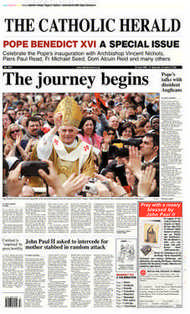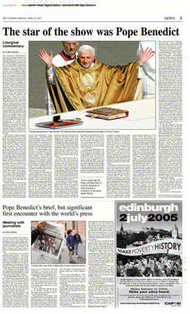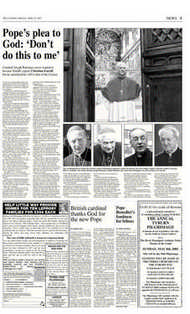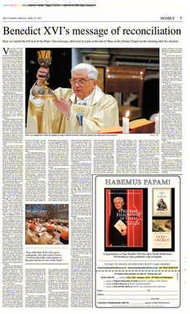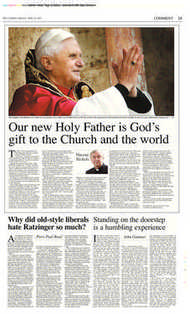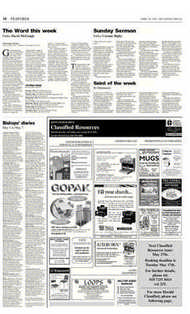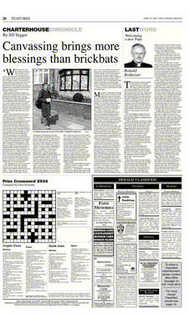Page 16, 29th April 2005
Page 16

Report an error
Noticed an error on this page?If you've noticed an error in this article please click here to report it.
Tags
Share
Related articles
Pope Asks Abbey Choir To Sing At St Peter’s
The Trials Of A Court Composer
'the Roadshows Are Over'
Pope Proclaims The Glory Of The Eucharist
Benedict Xvi Baptises 14 Infants In Sistine Chapel
Will Benedict rescue our music?
On the day of Benedict XVI’s first Mass as Pope, I received an e-mail from an Anglican friend. He had not been impressed by the televised liturgy, nor the music. “And to the think that the Sistine Chapel was the place where Palestrina’s divine notes were first heard,” he said sadly.
The music during this last marathon of Vatican ceremonies was not as dire as that of 1978; but the overall impression was still that of Taizé chants performed by the chorus of a provincial opera house. “Make a joyful noise unto the Lord,” says the Psalmist. It is a shame that he did not say anything about singing in tune, or performing music of artistic merit.
Admittedly, if the music for the Vatican ceremonies had been sub-contracted to Westminster Cathedral, the voices we heard would have been not only joyful but accurate, and expertly conducted. The same goes for the choir of Regensburg Cathedral, whose musical director was until a few years ago Fr Georg Ratzinger, the Pope’s brother. And in that piece of information lies a glimmer of hope for a Catholic musical tradition that is in decline not only in Rome, but all over the world.
Pope Benedict is the first pontiff for decades – possibly for centuries – who is a practising musician. Until his elevation, he played the piano for 15 minutes every day. Brought up within the orbit of Salzburg, he is devoted above all to the music of Wolfgang Amadeus Mozart (and this despite the Masonic motifs that run through so much of the composer’s mature music). In 1996, Cardinal Ratzinger told the journalist Peter Seewald: “You might say that there [in Salzburg] Mozart thoroughly penetrated our souls, and his music still touches me very deeply, because it is so luminous and at the same time so deep. His music is by no means just entertainment; it contains the whole tragedy of human existence.” What does the Pope’s love of music mean for the Church? Benedict believes that the celebration of the liturgy since the Second Vatican Council has fallen short of the ideals set out by the council fathers. And he is specifically worried by the Church’s failure to embrace or develop a musical language that properly fulfils the biblical injunction to sing to the Lord. His writings on music in the liturgy are elliptical and not easy to summarise; but one thing that does come across is a conviction that the Catholic Church once had such a language, has turned its back on it – and must rediscover it.
The new Pope has been dismissed as a fuddy-duddy for opposing the use of pop music in church. One can hardly blame him if this opinion is based on an experience of Catholic pop music, which tends to consist of hymns based on Joan Baez-style protest songs performed at roughly the pace of Purcell’s Funeral Music for Queen Mary. Rock music in Pentecostal churches is another matter, however, and if Pope Benedict had heard that at its best he might take a more relaxed view.
On the other hand, the Holy Father is emphatically not recommending that Catholic music should be self-consciously highbrow: he also has harsh things to say about “elite, degenerate” modern classical music that is rationally constructed and incapable of touching the whole person.
So what does he want? Let us remember his love of Mozart, and that, unlike Pope John Paul II, he grew up in a Catholic environment saturated with the music of the great German-speaking composers – Lutheran Bach as well as Catholic Haydn, Mozart and Bruckner. He is also deeply appreciative of the great Catholic music of earlier eras. On solemn occasions, says Benedict, it is not necessary to limit church music to the chanting of the psalms, because we have “an infinitely larger trove” of good liturgical music.
The new Pope writes with surprising boldness about the divine symbolism conveyed by the masterpieces of church music, now so rarely performed outside cathedrals or “traditionalist” parish churches. “Our Incarnate Lord, who was raised up on the cross, raised up our fallen nature,” he has written. “Western music, from Gregorian chant through Renaissance polyphony to Bruckner and beyond, lives from this great synthesis of spirit, intuition and sensuous sound.” And, in a remark that should strike fear into the heart of trendy parish music directors everywhere, he adds: “To hold the line against the onslaught of misguided attempts to import modern forms into the liturgy reuires the courage of asceticism, the courage to contradict.” But contradicting the received wisdom of diocesan authorities obsessed with folk hymns is easier said than done; it could prove to be one of the bigger challenges of Benedict’s pontificate. And it will cost money: there is a surplus of trained church musicians in the West, but they cannot be expected to give their services for free. Professionalism, after all, is precisely what church music has been lacking for decades.
How fortuitous, therefore, that this Pope is determined to clear away the expensive bureaucratic accretions of the Church’s bishops’ conferences. Let the burning of the papal ballots be followed by a bonfire of press releases and pointless episcopal reports. That should save enough money to allow the people of God to make a joyful noise unto the Lord that is actually worth listening to.
blog comments powered by Disqus


